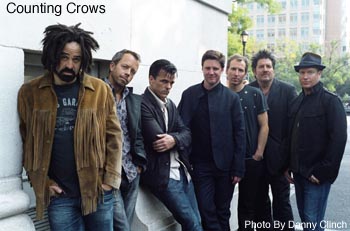Counting Crows interview
Counting Crows
Two Days A Week

“As far as I can tell — and I can’t guarantee this — I am real. It has often seemed to me like this was all a part of my imagination. Which is largely the problem. The fact that my life has seemed like a figment of my imagination to me is largely the problem in my life.”
Appearing: August 22nd at First Midwest Bank Amphitheatre in Tinley Park.
Ask Counting Crows frontman Adam Duritz about recurring names and themes that reappear throughout his band’s records, and whether they’re in reference to real people and situations, and that’s the response he’ll give. If it seems like Duritz is joking, think again. For him, the stories in his songs are very real remembrances of and reflections on his loves, losses, and especially, lost loves — themes Duritz doesn’t take lightly, which is evident when he makes remarks like “I think the worst thing in relationships isn’t even that they end, it’s that you go from meaning everything to someone to meaning nothing. Or, pretending to mean nothing.”
Most people recognize Duritz by his trademark dreadlocks, and remember Counting Crows from when they seemingly sprung up out of nowhere, dominating radio, MTV, and VH1 with their massive and infectious hit “Mr. Jones” from their 1993 debut, August And Everything After (Geffen). From there, the group would release three more studio records: 1996’s Recovering The Satellites, 1999’s experimental This Desert Life, and 2002’s underwhelming and seemingly complacent Hard Candy.
And then Counting Crows more or less disappeared. At least, to anyone not paying close attention. The band toured for about five years, first in support of Candy, then a greatest hits record entitled Films About Ghosts, and finally behind the band’s only real recognized studio accomplishment during that time, the uncharacteristically upbeat, Oscar-nominated Shrek 2 contribution, “Accid-entally In Love.” The seemingly endless touring, it turned out, was largely responsible for the delay.
“Whatever vestiges of sanity I had started with, were long gone at that point. I had gone in the tank. I just needed to stop, really badly,” Duritz recalls. “And, so I did. I mean, I just didn’t have any choice, really, I was kind of losing my mind. So, I just sort of stopped. And we still toured some, but I didn’t want to write anymore. I knew if you write a song, you end up making a record, you make a record, you end up having to really go on tour. I just didn’t feel like I wanted to do that anymore. Or I didn’t think I should do it until I figured out how to do it a little better.”
Ironically, it was “1492,” a song that had been around since the Hard Candy days and opens the new Saturday Nights & Sunday Mornings, that caused Duritz to reconsider. “I realized listening to that song there was a record I wanted to make. And that’s how I got started again.”
For their fifth proper studio effort, the band deliver a double-concept album on a single disc. Saturday Nights opens the album and finds Counting Crows at their most energized since Satellites. Which is hardly a coincidence, as the albums have their fair share of similarities and overlap, not only in terms of intensity level, but also in terms of tone and overarching storylines.
“I think, thematically, the story of [Satellites and Saturday Nights], is kind of the same story, in some ways,” Duritz confirms. “It’s about crashing to the ground, and trying to get back up again.”
Adding to the overlap, for the Saturday half the group enlisted Satellites producer Gil Norton, whose influence is immediate. Out of the gate, the breakneck “1492” sets a tone of big guitars and sweeping melodies behind themes of recklessness, excess, debauchery, and “disintegration” — a term Duritz uses to describe the album’s songs more than a few times. The Saturday songs are also some of the band’s most realized, drawing from the best elements of the outfit’s past efforts. The alternatingly jaunty and hushed “Sundays” recalls the lush, loose, playful tone of This Desert Life‘s finest moments, while “Insignificant” channels the unrest and angst of Satellites hit “Angels Of The Silences.”
On the flipside, however, the Sunday Mornings half is Duritz and co. somber and sober, stripped-down and folksier. Over the years, there have been countless examples of established alternative artists venturing into boring, unplugged forays. For Duritz, however, he and the band were out to avoid that model, instead looking to artists like Sufjan Stevens, whose work, especially on Illinois, Duritz refers to as “genius.”
— Jaime de’Medici
To find out what Duritz means, grab the May issue of Illinois Entertainer, available free throughout Chicagoland.











